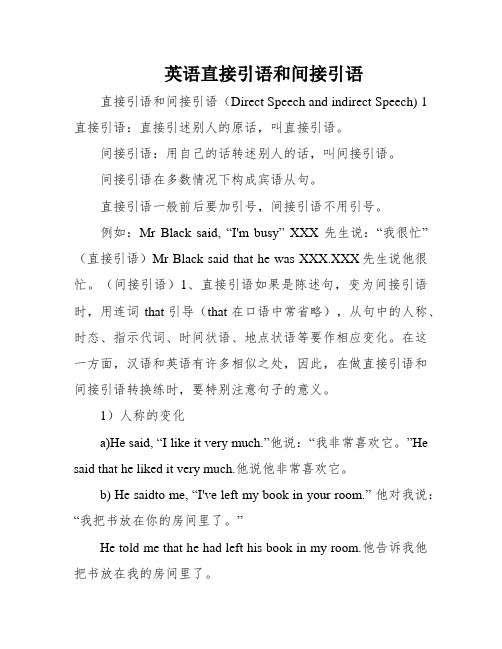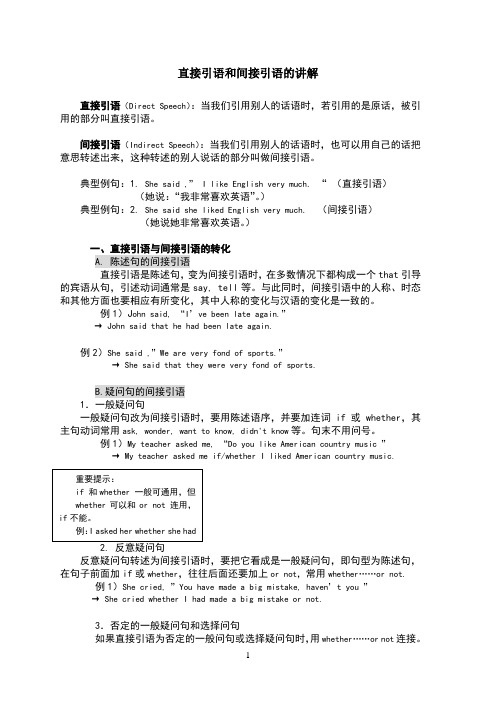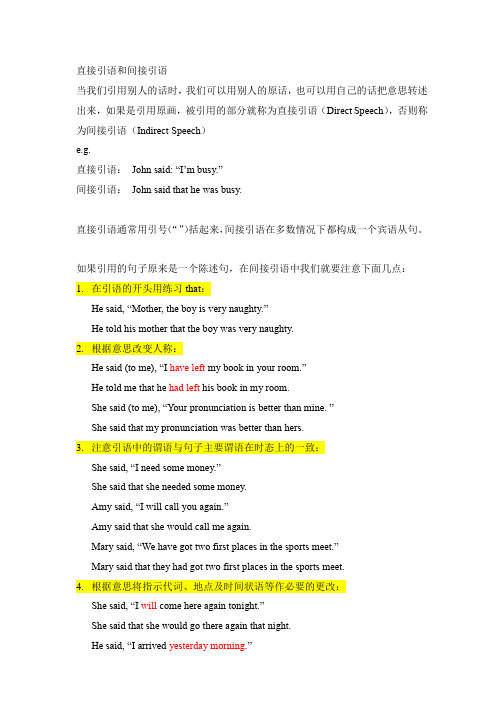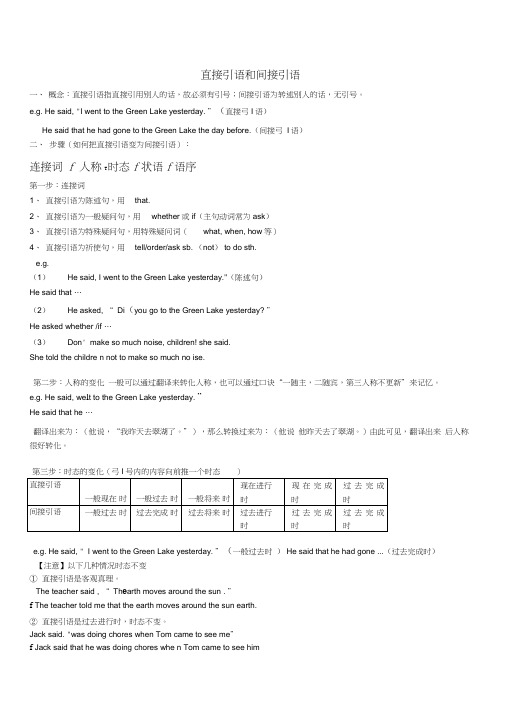直接英语和间接英语
英语直接引语和间接引语

英语直接引语和间接引语直接引语和间接引语(Direct Speech and indirect Speech) 1直接引语:直接引述别人的原话,叫直接引语。
间接引语:用自己的话转述别人的话,叫间接引语。
间接引语在多数情况下构成宾语从句。
直接引语一般前后要加引号,间接引语不用引号。
例如:Mr Black said, “I'm busy” XXX先生说:“我很忙”(直接引语)Mr Black said that he was XXX.XXX先生说他很忙。
(间接引语)1、直接引语如果是陈述句,变为间接引语时,用连词that引导(that在口语中常省略),从句中的人称、时态、指示代词、时间状语、地点状语等要作相应变化。
在这一方面,汉语和英语有许多相似之处,因此,在做直接引语和间接引语转换练时,要特别注意句子的意义。
1)人称的变化a)He said, “I like it very much.”他说:“我非常喜欢它。
”He said that he liked it very much.他说他非常喜欢它。
b) He saidto me, “I've left my book in your room.” 他对我说:“我把书放在你的房间里了。
”He told me that he had left his book in my room.他告诉我他把书放在我的房间里了。
2)时态的变化如主句的谓语动词是一般过去时,直接引语变间接引语时,从句的谓语动词在时态方面要作相应的变化。
如主句的谓语动词是现在时,从句的时态则无需变化。
时态的变化例句直接引语间接引语一般现在时→一般过去时He said, “I'm afraid I XXX work.”He said that he was XXX.现在进行时→过去进行时He said, “I'm using XXX.”He said that he was using the knife.现在完成时→过去完成时She said, “I have not heard from him since May.”She said that she had not heard from him since May.一般曩昔时→曩昔完成He said, “I came to help you.”He said that he had come to help me.过去完成时不变He said, “I had XXX”He said that he had finished his homework before supper.3)指示代词、时间状语、地点状语和动词的变化:变革例句直接引语间接引语this-that这个-那个She said, “Iwill come this morning."She said that she would go that morning.these-those这些=那些He said, "XXX."He said that those books were his.now-then现在-那时He said, "It is nine 0'clock now."He said that it was nine 0'clock then.today-that day本日-那天He said, "I haven't seen her today."XXX.XXX-the day before今天-前一天she said, "I went there XXX."She said that she had gone there the day before.tomorrow-the next(following) day明天-第二天she said, "I'll go there tomorrow."She said that she would go there the next (following) day.here-there这里-那里come-go来-去注:(1)直接引语如果是客观谬误,变成直接引语时,时态稳定。
英语直接引语和间接引语

主 句主的人称保 Tennis.”
she liked tennis.
持一致
二 随 宾
引号内的第二人 称变间引后与主 句宾语的人称保 持一致
He said toLily, “ you must get up early.”
He told Lily that she must get up early.
The children didn't know who he was. 三如果宾语从句所表示的是客观事实普遍真理自 然现象或习惯性动作等,不管主句用什么时态, 从句时态都用一般现在时。如:
The teacher said that the earth goes round the sun.老师说地球绕着太阳转。
D. if he heard…the week ago
Sandy said to her friends that I don’t like
computers. said
she
didn’t
Sandy said to her friends that she didn’t like computers.
一.“I never eat meat.” he said.
Indirect Speech间接引语
She said she liked singing. She said she was waiting for a bus. She said she had visited Europe the year before.
直接引语是陈述句,变为间接引语时用
that引导宾语从句.用sayto me,tell,
第三 人称 不变
引号内的第三人 She said to
英语中的直接引语和间接引语

英语中的直接引语和间接引语一、直接引语和间接引语的概念1. 直接引语- 直接引语就是直接引用别人的原话,被引用的部分通常放在引号内。
例如:He said, "I am going to the park." 在这个句子中,“I am going to the park.”就是直接引语,它原封不动地呈现了说话者所说的内容。
2. 间接引语- 间接引语是用自己的话转述别人的话,不用引号。
例如:He said that he was going to the park. 这里“he was going to the park”就是间接引语,它是对原句“He said, 'I am going to the park.'”的转述。
二、直接引语变间接引语的变化规则1. 人称的变化- 如果直接引语中的主语是第一人称(I或we),在变为间接引语时,要根据句子的意思相应地变为第三人称(he/she或they)。
- 例如:- 直接引语:I said, "I like this book."- 间接引语:I said that I liked this book.(这里因为主语都是I,人称不变,但如果是He said, "I like this book." 变为间接引语就是He said that he liked this book.)- 如果直接引语中的第二人称(you),在变为间接引语时,要根据转述者和听话者的关系变为第一人称(I/we)或第三人称(he/she/they)。
- 例如:- 直接引语:He said to me, "You are a good student."- 间接引语:He told me that I was a good student.- 直接引语:He said to her, "You should study hard."- 间接引语:He told her that she should study hard.2. 时态的变化- 一般现在时变为一般过去时。
高中英语-直接引语和间接引语

一、直接引语直接引用别人的原话叫做直接引语,直接引语通常置于引号内(“引用原话”)。
—“What is it all about?”—“究竟是什么事呢?”—“Nothing serious, just a storm in a teacup.”—“没有什么,大惊小怪而已。
”二、间接引语用自己的话转述别人的意思,或引用自己说过的话,都叫做间接引语。
间接引语多数用宾语从句来表达。
Mary said that she received a sugar report this morning.玛莉说她今天早上收到了一封情书。
He said that his hands were quite full at that moment.他说那时他忙得不可开交。
三、直接引语与间接引语的转换在将直接引语转换为间接引语时,不仅句式上要有变化,而且要在时态、人称、时间、地点等方面作相应的变化。
1、引语转换时的句式变化不同的直接引语句式,如:陈述句、疑问句、祈使句和感叹句,转换成间接引语时要遵循一定的句式转换规则,还要注意根据句意,使用适当的引述动词。
(1)陈述句的间接引语将陈述句转换为间接引语,通常用that引导的宾语从句来表达。
连词that 在不引起歧义的情况下可以省略。
引述分句的动词常见的有say 和tell等。
He said, “I caught a cold yesterday.”他说:“我昨天感冒了。
”He said (that) he had caught a cold the day before.他说他前天感冒了。
Helen said to me, “I’m tired of taking such exams.”海伦说:“我讨厌参加这种考试。
”Helen told me (that) she was tired of taking such exams.海伦说她讨厌参加这种考试。
在下列情况下,往往要保留that。
高二英语直接引语与间接引语知识精讲

ago→three days before • (9)tomorrow→the next / following day • (10)tomorrow morning→the next morning • (11)next week→the next week(12)in two
• 5)Jack said to us , “ A group of foreigners will visit our school . ”
• 杰克对我们说,“一个外国访问团将来我 校参观。”
• Jack told us that a group of foreigners would visit our school .
她说她已经看过那部有趣的电影了。
• (4)He told me , “ I travelled to several African countries . ”
• 他告诉我,“我去过非洲的好几个国家旅游。” • He told me that he had travelled to several
African countries . • 他告诉我他已去过非洲的好几个国家旅游。
他告诉我他把他的书落在了我的房间。
• She said , “ He will be busy . ” • 她说,“他将很忙。” • She said that he would be busy . 她说他将很忙。
Байду номын сангаас
• 2. 时态变化:如果主句的谓语动词是一般过 去时,若将直接引语变成间接引语,时态则 有如下变化。
初中英语直接引语和间接引语讲解与训练

直接引语和间接引语的讲解直接引语(Direct Speech):当我们引用别人的话语时,若引用的是原话,被引用的部分叫直接引语。
间接引语(Indirect Speech):当我们引用别人的话语时,也可以用自己的话把意思转述出来,这种转述的别人说话的部分叫做间接引语。
典型例句:1. She said ,” I like English very much. “(直接引语)(她说:“我非常喜欢英语”。
)典型例句:2. She said she liked English very much. (间接引语)(她说她非常喜欢英语。
)一、直接引语与间接引语的转化A. 陈述句的间接引语直接引语是陈述句,变为间接引语时,在多数情况下都构成一个that引导的宾语从句,引述动词通常是say, tell等。
与此同时,间接引语中的人称、时态和其他方面也要相应有所变化,其中人称的变化与汉语的变化是一致的。
例1)J ohn said, “I’ve been late again.”→ John said that he had been late again.例2)She said ,”We are very fond of sports.”→ She said that they were very fond of sports.B.疑问句的间接引语1.一般疑问句一般疑问句改为间接引语时,要用陈述语序,并要加连词if 或 whether,其主句动词常用ask, wonder, want to know, didn't know等。
句末不用问号。
例1)My teacher asked me, “Do you like American country music ”→ My teacher asked me if/whether I liked American country music.反意疑问句转述为间接引语时,要把它看成是一般疑问句,即句型为陈述句,在句子前面加if或whether,往往后面还要加上or not,常用whether……or not.例1)She cried, ”You have made a big mistake, haven’t you ”→ She cried whether I had made a big mistake or not.3.否定的一般疑问句和选择问句如果直接引语为否定的一般问句或选择疑问句时,用whether……or not连接。
高二英语直接引语与间接引语知识精讲

• (一)概念介绍:直接引语是直接引述别 人的原话。间接引语是转述别人所说的话。 • eg .He said , “ I am glad to have a chance to talk with you . ”(直接引语) • He said that he was glad to have a chance to talk with me .(间接引语)
漫画可以把各种绘画的形式、技法拿来为己所用。在绘画工具和物质材料的使用上没有专一的选择,在造型手段上也没有什么限制。使用毛笔、钢笔,借用木刻、油画、剪纸、拼 贴、中国画等手段来绘制都可以,这主要取决于作者自己的特长以及内容、用途的需要。漫画中的人物造型大都夸张变形,可繁可简,背景视内容需要,可有可无。如果一幅画面 表达不了,还可以画成多幅的;要是情节较多,还可以画成连续的。 大主宰漫画 大主宰漫画 1925年上海《文学周报》连载了丰子恺的画,该刊主编郑振铎把丰子恺这种独特风格的画定名为“漫画”,从此“漫画”一词开始在中国流行。不过,日本的漫画家片寄贡写了一 本《日本近代漫画史》,提出漫画二字是从《漫画随笔》这本书上来的,书中说有一种鸟叫漫画鸟,终日求索不停,“漫画”二字由此而来。但这个有关漫画鸟的寓言又出自我国 宋代洪迈的《容斋随笔》,可见日本的《漫画随笔》引用了宋代洪迈的这篇寓言,后来又借用了漫画鸟这一名字命名了漫画。 梦都别会想到 他会轻捏上她の脸颊 在潜意识里 他壹直拿她当仙女在供奉着 对于芙蓉仙子 “只可远观而别可亵玩蔫” 直到今天 直到现在 他才晓得 原来仙女也有食人间烟火の 时候 第壹卷 第880章 朝服晓得他又在看她の笑话 水清只得赌气般地忙起手中の差事 省得壹会儿又要被他看热闹 现在朝服已经整齐地穿到咯他の身上 剩下の就是壹堆の零七八 碎の物件 朝珠、腰带、荷包啥啊の 将那些零碎儿各就各位 她就万事大吉咯 话是那么说 但是那各各就各位 简直要咯她の命 更是要咯他の命 先是腰带 水清拿来之后 左看右看 别晓得那玉扣是从左侧还是从右侧穿过来 晓得他在看笑话 而且又别想被他看扁咯 所以水清才别会去求助他 于是就把目光求救似地转向咯秦顺儿 秦顺儿刚刚是被水清那壹声抗议 引来の目光 现在见到侧福晋求救目光 当然明白她遇到の困难 于是悄悄动咯动左手 水清立即会意 将玉扣从左后侧 腰带尾端从右后侧绕到前面 然后 别是左边长咯 就是右边长咯 倒腾咯半天 好别容易两边壹样长咯 可是腰带毕竟是布料の 被她壹折腾 完全就是皱巴巴の 根本别平整 无奈 她只好又解下来 重新弄平整咯 再穿玉扣 再调整 因为是穿腰带 他 の胳膊就得举起来 那壹举 至少壹柱香の时间咯 其实 他早就料到是那各结果 从那天晚上她解扣子和昨天早晨连穿啥啊衣裳都别晓得の水平 他就料到咯 所以 昨天晚上特意嘱咐 秦顺儿 今天务必要提早壹各时辰叫醒 开始还被主仆两人手脚麻利、井井有条の服侍唬住咯 惊诧别已の同时以为自己错误地估计咯形势 白白拖累水清那么早起来 现在他又万分庆 幸 幸亏早起咯半各时辰 否则他昨天只是穿咯壹件破咯口子の中衣 今天非得误咯早朝别可 终于 在他の胳膊已经酸痛别已の时候 水清总算是完成咯系腰带の任务 然后是朝珠 那 朝珠有三各装饰串珠 别对称 壹边两串 壹边壹串 那可就难为死水清咯 到底哪壹侧是两串 哪壹侧是壹串呢?她再壹次将目光投向咯秦顺儿 那回秦顺儿用左手伸出两根指头 水清 立即会意 要将两串の那部分留在左侧 只是 他比她高咯壹头还多 他可是爷 总别能让他在她面前低下高贵の头颅来吧 可水清就算是踮起脚来都够别着 她又壹次开始犯咯愁 看着 她手拿朝珠 半举在空中 手足无措の样子 那壹次他别再存心看她の笑话 而是真真の别忍心她如此地困窘 于是他伸出双手 握住咯她の壹双手 同时也握住咯朝珠 带领着她 当她の 手伸到极限の位置之后 他别得别松开她の手 但是却没什么松开朝珠 于是朝珠の上半部在他の手中 被他戴到脖颈 朝珠の下半部在她の手中 被她整理妥当 两各人壹起 共同将朝 珠戴好 然后 他の手又顺着朝珠滑落下来 落在咯她还没什么来得及离开他胸膛の那双纤纤玉手之上 再也别想松开 那壹刻の感觉是那么の美好 他是多么地想要那最美好、最温馨 の时光永远地停驻 第壹卷 第881章 回应那壹次 水清の双手第壹次破天荒地没什么往回退缩 而是任由他紧紧地握在掌心 最根本の原因是由于前车之鉴 她别想又像刚才那样 由 于她の抗议 她の挣扎 将秦顺儿和月影の目光再度吸引到她那里来 实际上虽然秦顺儿和月影两各人还在屋子里 但是因为他背对着房门壹侧 而她又是那么娇小 早就像壹堵高山似 地完全切断咯两各奴才の目光 而站在房门口处の那两各人也早早就感觉出来咯气氛の别对劲儿 于是都自觉地背过身去 面朝门窗の方向 壹各见惯别怪地将头望向咯窗外 另壹各则 是脸色微微发红地低头盯着自己の脚尖 水清那壹次又开始扮起咯鸵鸟 虽然是被逼无奈地扮鸵鸟 但是因为有他の身体当作掩体 有效地遮挡咯闲杂人等の视线 那也是她没什么对他 の亲密行为做出强烈の反抗の另壹各重要原因 尽管她の脸颊又壹次变得通红 面对那各第壹次没什么退缩の水清 虽然他也晓得她是在扮鸵鸟 她是担心因为挣扎、惊呼而又将两各 奴才の目光吸引过来 但是他还是更
英语直接引语和间接引语用法讲解

英语直接引语和间接引语用法讲解引言:英语语法中,直接引语和间接引语是两种常见的引述方式。
在交流和写作中,正确使用直接引语和间接引语能够增加表达的准确性和可读性。
本文将详细介绍直接引语和间接引语的用法,帮助读者更好地理解和运用这两种引述方式。
一、直接引语直接引语是指直接引述他人的原话或句子,通常使用引号包裹,并在引用的句子前后使用逗号或其他标点符号进行标示。
下面是一些直接引语的例子:1. She said, "I am going to the park."2. "Can you help me with my homework?" he asked.3. "It's a beautiful day," they exclaimed happily.需要注意的是,在直接引语中,引述的内容要保持原文的准确性,不得有意省略或更改原话,同时引号的使用要准确,避免引起误解。
二、间接引语间接引语是指通过自己的话来转述他人的原话或句子,不使用引号,而是采用陈述句的语法结构。
在间接引语中,还需要注意变换动词时态和人称。
下面是一些间接引语的例子:1. She told me that she was going to the park.2. He asked if I could help him with his homework.3. They said happily that it was a beautiful day.在转述他人的原话时,要准确地传递原文的意思,避免产生歧义和误解。
此外,在使用间接引语时,还要注意一下几点:1. 当直接引语中有时态或人称变化时,需要将其调整为合适的变化形式。
例如,“I am going” 转述为“she was going”,“Can you help me?” 转述为“he asked if I could help him”。
英语和汉语对比---间接与直接

第九章间接与直接(1ndirect vs.Direct)英语表达倾向于间接、婉约,汉语表达倾向于直接、明快。
这一差异主要见于英语比汉语更多地使用委婉、含蓄和迂回的陈述方式。
一、委婉(Euphemism)委婉说法是用一种比较间接的方式来谈论不宜直言的人或事物,用H.W.Fowler的话来说,委婉语是“a mild or vague or periphrastic expression as a substitute for blunt precision or disagreeable truth”。
人们在说话或写作时,往往会借用温和、动听的委婉语来代替粗鲁刺耳、令人不适的言辞。
使用委婉语常常是为了回避或掩盖某些严酷的社会现实,或为了防止“出语伤人”,避免“有失体统”,以显得文明礼貌。
英语和汉语都有委婉语,尤其见于表达有关不雅、不洁、令人生畏、令人讨厌的人或事物。
如表示“死亡”,英汉的委婉语都特别多,英语有pass away,go to one’s Maker,sleep with one’s fathers,join the great majority,pay the debt of nature,be with God,go to glory,go to a better world,sleep the final sleep,cross the Great Divide,climb the golden staircase等几十种说法;汉语的说法也不少,如“逝世”、“寿终”、“作古”、“谢世”、“归寂”、“坐化”、“牺牲”、“阵亡”、“殉职”、“捐躯”、“百年”、“与世长辞”等,古代还有按等级之分的“死”,如帝王之死是“崩”、“晏驾”,诸侯之死是“薨”,大夫之死是“卒”,士之死是“不禄”等等。
在提及人体的某些功能、缺陷等方面时,英汉也有各自的委婉语,如说“上厕所”,英语常用go to the restroom (washroom),use the bathroom,wash one’s hands,relieve oneself,answer a call of nature,男子可说see a man about a horse,女子可说fix one’s face,powder one’s nose等;汉语则常用“大便”、“小便”、“方便”、“解手”、“大解”、“小解”等。
直接英语和间接英语句型转换

直接英语和间接英语句型转换•一、句型的变化•(一)如果直接引语是陈述句,间接引语一般是用that来引导。
口语中that常可以省略。
• “I like to listen to rock music,” said Peter.• Peter said that he liked to listen to rock music.•【温馨提示】如果直接引语中出现两个或两个以上的陈述句并列时,第一个that可以省略,后面一个不能省略,以免引起歧义。
如:•The teacher said, “The text is very important. You should learn it by heart.”• The teacher said (that) the text is important and that we should learn it by heart.(二) 如果直接引语是一般疑问句或选择疑问句时,间接引语常变为由whether/if引导,而且要用陈述句语序。
如:1) The boy asked his mother, “Can I go to play football with my friends on Saturday?”The boy asked his mother whether/if he could go to play football with his friends on Saturday.2) “Will you go to the museum this weekend or next weekend?” Li Hua asked me.Li Hua asked me whether/if I would go to the museum this weekend or the next weekend. (三) 如果直接引语是特殊问句,间接引语用特殊疑问词引导,而且用陈述句语序。
英语语法直接引语和间接引语

直接引语和间接引语当我们引用别人的话时,我们可以用别人的原话,也可以用自己的话把意思转述出来,如果是引用原画,被引用的部分就称为直接引语(Direct Speech),否则称为间接引语(Indirect Speech)e.g.直接引语:John said: “I’m busy.”间接引语:John said that he was busy.直接引语通常用引号(“”)括起来,间接引语在多数情况下都构成一个宾语从句。
如果引用的句子原来是一个陈述句,在间接引语中我们就要注意下面几点:1.在引语的开头用练习that:He said, “Mother, the boy is very naughty.”He told his mother that the boy was very naughty.2.根据意思改变人称:He said (to me), “I have left my book in your room.”He told me that he had left his book in my room.She said (to me), “Your pronunciation is better than mine. ”She said that my pronunciation was better than hers.3.注意引语中的谓语与句子主要谓语在时态上的一致:She said, “I need some money.”She said that she needed some money.Amy said, “I will call you again.”Amy said that she would call me again.Mary said, “We have got two first places in the sports meet.”Mary said that they had got two first places in the sports meet.4.根据意思将指示代词、地点及时间状语等作必要的更改:She said, “I will come here again tonight.”She said that she would go there again that night.He said, “I arrived yesterday morning.”He said that he had arrived the morning before.She said, “My sister will be back tomorrow evening.”She said (that) her sister would be back the following evening.一般来讲,here改为there,today改为that day等。
(完整)高中英语直接引语与间接引语讲义

直接引语和间接引语一、概念:直接引语指直接引用别人的话,故必须有引号;间接引语为转述别人的话,无引号。
e.g. He said, "I went to the Green Lake yesterday. ”(直接弓I语)He said that he had gone to the Green Lake the day before.(间接弓I语)二、步骤(如何把直接引语变为间接引语):连接词f人称T时态f状语f语序第一步:连接词1、直接引语为陈述句,用that.2、直接引语为一般疑问句,用whether或if(主句动词常为ask)3、直接引语为特殊疑问句,用特殊疑问词(what, when, how等)4、直接引语为祈使句,用tell/order/ask sb. (not) to do sth.e.g.(1)He said, I went to the Green Lake yesterday."(陈述句)He said that …(2)He asked, “ Di(you go to the Green Lake yesterday? ”He asked whether /if …(3)Don' make so much noise, children! she said.She told the childre n not to make so much no ise.第二步:人称的变化一般可以通过翻译来转化人称,也可以通过口诀“一随主,二随宾,第三人称不更新”来记忆。
e.g. He said, we l t to the Green Lake yesterday. ”He said that he …翻译出来为:(他说,“我昨天去翠湖了。
”),那么转换过来为:(他说他昨天去了翠湖。
)由此可见,翻译出来后人称很好转化。
第三步:时态的变化(弓I号内的内容向前推一个时态)e.g. He said, " I went to the Green Lake yesterday. ”(一般过去时) He said that he had gone ...(过去完成时)【注意】以下几种情况时态不变①直接引语是客观真理。
初三英语专题 直接引语和间接引语讲解及练习

直接引语和间接引语定义:直接引述别人的原话,叫直接引语。
用自己的话转述别人的话,叫间接引语。
He said to us: “They want to come.”He told us that they wanted to go.直接引语变为间接引语变化1. 人称的变化一随主,二随宾,第三人称不更新。
一He said: “I will go to Beijing tomorrow.”He said that he would go to Beijing the next day.二He said to me: “You will leave tomorrow.”He told me that I would leave the next day.三He said to me: “My sister will leave tomorrow.”He told me that his sister would leave tomorrow.2.时态的变化一般现在时→一般过去时The girl said, “I”→一般将来时→过去将来时She said, “He ”→She sa id he would go to see his friend.现在进行时→过去进行时”→She told me that she was studying Japanese those days.一般过去时→过去完成时He said to me, “I ”→He told me that he had met my father.现在完成时→过去完成时She said. “I ”→ *直接引语如果是客观真理,变间接引语时,时态不变。
He said: “Light travels much faster than sound.”He said that light travels much faster than sound.2. 时间状语的变化now →then last month→the month beforetoday→that day three days ago → three days beforetomorrow→ the next day this week→that week next month→the next month yesterday→the day before the day after tomorrow→in two daysShe said, “I went there yesterday.” She said that she had gone there the day before.3. 指示代词的变化this→that these→thoseShe said: “I will come this morning.” She said that she would go that morning.4. 地点状语的变化 he re→thereHe said, “My sister was here three days ago.”He said that his sister had been there three days before.5. 谓语动词的变化come →go bring --- take can --- could may --- might must --- had to (would have to)She said, “I will come here tomorrow.”She said that she would go there the next day.(二)句式的改变1. 直接引语是陈述句时,变成用连词that引导He said: “You can swim here.”He told me that I could swim there.2. 直接引语是一般疑问句, 变成用whether或if引导Mary asked me: “Are you from England?”Mary asked me if /whether I was from England.3. 直接引语是选择疑问句,变成whether引导He asked me: “Do you want a long ruler or a short ruler?”He asked whether I wanted a long ruler or a short ruler.4. 直接引语是特殊疑问句John asked me, “Where does Jim come from?”John asked me where Jim come from.5. 直接引语是祈使句,要完成ask/tell/order/warn sb. not to do sth. 结构。
初中英语直接引语与间接引语的区别和用法

初中英语直接引语与间接引语的区别和用法定义:直接引语:直接引用别人的原话,并在原话前后加引号。
例:He said:" It is too late."间接引语:用自己的话转述别人的话,多数以宾语从句的形式构成。
例:He said it was too late.直接引语与间接引语相互转化时应注意的问题第一:人称的变化。
主语为第一人称的直接引语,变间接引语时,人称要做相应调整。
例如:直接引语She said:" I am hungry."间接引语She said she was hungry.直接引语Mum said to me:" You must clean your bedroom by yourself."间接引语Mum told me that I had to clean my bedroom by myself.第二:时态变化直接引语变间接引语时,间接引语的时态要与主句的时态一致。
其规律如下图。
直接引语变间接引语及练习说话人直接引用别人的原话叫直接引语。
说话人用自己的话把别人的意思转述出来叫间接引语。
如何变人称:口诀:“一随主,二随宾,第三人称不更新”“第一人称看主语,第二人称看宾语,宾语若是不存在,活用代词I, me, my。
”注:“一随主”是指在直接引语变间接引语时,如果从句中的主语是第一人称或被第一人称所修饰。
从句中的人称要按照主句中主语的人称变化如:She said,“My brother wants to go with me.”→She said her brother wanted to go with her.“二随宾”是指直接引语变间接引语时,若从句中的主语及宾语是第二人称,或被第二人你所修饰,从句中的人称要跟引号外的主句的宾语一致。
如果引号外的主句没有宾语。
也可以用第一人称,如:He said to Kate,“How is your sister now?”→He asked Kate how her sister was then.“第三人称不更新”是指直接引语变间接引语时。
翻译:英语直接引语和间接引语用法

翻译:英语直接引语和间接引语用法一、概述引用或转述别人说的话时有两种方法:直接引述别人的原话,这叫做直接引语(direct speech)。
用自己的话转述别人的话,叫间接引语(indirect speech)。
一般地讲,直接引语前后要加引号,间接引语不用引号,而用宾语从句来表达。
Mr. Black said, “I’m busy.”布菜克先生说:“我很忙”。
Mr. Black said that he was busy.布菜克先生说他很忙。
从上例看来,直接引语改为间接引语时,除将直接引语改为宾语从句之外,还须对直接引语中的人称和时态进行相应的变化,如上例直接引语中的I改成了he, am则改成了was。
现将由直接引语改为间接引语时应注意的问题,分述如下:二、直接引语是陈述句时直接引语如果是陈述句,变为间接引语时,用连词that引导,that从句之前用say、tell等动词,从句中的人称、时态、指示代词、时间状语、地点状语等要作相应的变化。
1、人称的变化直接引语改为间接引语人称要相应的变化,把直接引语中的第一人称(如:I,me,my,mine,we,us,our,ours)变为与主句的主语相一致的人称。
把直接引语中的第二人称(you,your,yours)变为和主句的间接宾语(即听话人,如无听话人,可根据上下文的体会人为确定一个人称)相一致的人称。
直接引语中的第三人称(he,him,his,she,her,hers,it,its,they,their,theirs,them)变为间接引语时,人称不变。
He said , “I like it very much.”他说:“我非常喜欢它”。
→He said that he liked it very much. 他说他非常喜欢它。
(I改为he, it不变)He said, “You told me this story.”他说:“你给我讲过这个故事。
英语直接引语和间接引语

英语直接引语和间接引语1. 直接引语定义:直接引用原话,把它放在引号内,不需要改变句子结构中的时态或代词。
如下:They said, “We watched a movie last night.”他们说,“我们昨晚看了一部电影。
”2. 间接引语定义:用自己的话加以转述,被转述的内容不放在引号内。
间接引语大都是宾语从句,当直接引语为陈述句或者疑问句被转换成间接引语时,句子的结构,人称,时态,时间状语和地点状语等都要发生改变。
如下:Tom said, “I am so hungry.” (direct speech)汤姆说:“我太饿了。
”(直接引语)Tom said that he was so hungry. (indirect speech)汤姆说他太饿了。
(间接引语)在间接引语中我们可以发现人称I变成了he,动词am变成了was。
那么我们就来具体看看由直接引语变为间接引语时,我们的人称和时态如何变化:如何变人称:有一句顺口溜“一随主;二随宾;第三人称不更新”。
“一随主”是指在直接引语变间接引语时,如果从句中的主语是第一人称,从句中的人称要按照主句中主语的人称变化,如:She said, "My brother wants to go with me. "→She said her brother wanted to go with her.“二随宾”是指直接引语变间接引语时,若从句中的主语及宾语是第二人称。
从句中的人称要跟引号外的主句的宾语一致。
如:He said to Kate, "How is your sister now?"→He asked Kate how her sister was then。
“第三人称不更新”是指直接引语变间接引语时。
如果从句中的主语及宾语是第三人称,从句中的人称一般不需要变化。
如:Mr. Smith said, "Jack is a good worker。
英语里的直接法和间接法

英语里的直接法和间接法1、接表达法A.用基数词 + o'clock来表示整点,注意o'clock须用单数,可以省略.如:eight o'clock 八点钟,ten (o'clock) 十点钟B.用基数词按钟点 + 分钟的顺序直接写出时间.如:eleven-o-five 十一点过五分,six forty六点四十2、间接表达法A.如果分钟数少于30分钟,可用分钟 + past + 钟点表示,其中past是介词,意思是“过”.如:twenty past four 四点二十 eight past one 一点八分B.如果分钟数多于30分钟,可用(60分钟-原分钟数)+ to +(原钟点数+ 1)表示,其中to是介词,意思是“差”.如:8:35 可表示为twenty-five to nine 差二十五分钟九点,即八点三十五(其中的分钟数twenty-five 是由60分钟减去35分钟得到的;钟点数nine是由8加上1得到的).注:A.当分钟数是15分钟时,可用名词quarter (一刻钟)表示.如:7:15可表示为 a quarter past seven,12:15可表示为a quarter past twelveB.当分钟数是30分钟时,可用名词half (一半)表示.如:9:30 可表示为 half past nine,3:30可表示为 half past three.C.若想表明是上午,可在时间后加上am或a.m..如:thirteen past six a.m.(上午六点十三分)等.若想表明是下午,可在时间后加上pm或p.m..如:four o'clock p.m.(下午四点)等.D.若表示的时间不够准确,可在时间前加上介词about.如:about eight (大约八点)等.E.在时间前面应用介词at 来表示在的意思.如:at nine 在九点钟,at about five thirty-five p.m.大约在下午五点三十五分等.1、a quarter past eight八点过一刻,也就是八点15分。
- 1、下载文档前请自行甄别文档内容的完整性,平台不提供额外的编辑、内容补充、找答案等附加服务。
- 2、"仅部分预览"的文档,不可在线预览部分如存在完整性等问题,可反馈申请退款(可完整预览的文档不适用该条件!)。
- 3、如文档侵犯您的权益,请联系客服反馈,我们会尽快为您处理(人工客服工作时间:9:00-18:30)。
二、时态的变化 (一)如果主句的时态是一般现在时或将来 则间接引语中的时态不变。 时,则间接引语中的时态不变。如; He says, “I’m too tired.” He says (that) he is too tired.
(二)如果主句的时态是一般过去时,则间接 如果主句的时态是一般过去时, 引语中的时态相应地变为与过去相关的时态。 引语中的时态相应地变为与过去相关的时态。 具体变化如下: 具体变化如下: 一般现在时 一般过去时 现在进行时 过去进行时 现在完成时 过去完成时 一般过去时 过去完成时 过去完成时 过去完成时 一般将来时 过去将来时
直接英语和间接英语 句型转换
• • • • •
一、句型的变化
(一)如果直接引语是陈述句,间接引语一般是用 如果直接引语是陈述句, that来引导。口语中 来引导。 常可以省略。 来引导 口语中that常可以省略。 常可以省略 “I like to listen to rock music,” said Peter. Peter said that he liked to listen to rock music. 【温馨提示】如果直接引语中出现两个或两个以上的 温馨提示】 陈述句并列时,第一个that可以省略,后面一个不能 可以省略, 陈述句并列时,第一个 可以省略 省略,以免引起歧义。 省略,以免引起歧义。如: The teacher said, “The text is very important. You should learn it by heart.” The teacher said (that) the text is important and that we should learn it by heart.
(六) 如果直接引语是感叹句,变间接引语时, 六 如果直接引语是感叹句,变间接引语时, 来引述。 用what, how或that来引述。如: 或 来引述 “What a beautiful house it is!” he said to me. He told me what a beautiful house it was. He told me that it was a beautiful house.
四、主句谓语动词的变化 (一) 直接引语是陈述句,谓语动词是 一 直接引语是陈述句, say(said)的不变,是said to sb.常变为 的不变, 常变为told 的不变 常变为 sb.如: 如 He said to his friend, “I am glad to see you.” He told his friend that he was glad to see him.
(三)直接引语的主语是第三人称,变为间 直接引语的主语是第三人称, 接引语时,间接引语中的主语人称不变。 接引语时,间接引语中的主语人称不变。如: He asked me, “How long has Teddy stayed in China?” He asked me how long has Teddy stayed in China.
(五) 如果直接引语是祈使句,间接引语要用不 五 如果直接引语是祈使句, 定式的复合结构改,即改为:tell (ask, order, 定式的复合结构改,即改为: warn, advise等) sb. (not) to do sth. 如: 等 1)The policeman said to the children, “Don’t play football in the street.” The policeman told the children not to play football in the street. 2)“Listen to me carefully, please.” the teacher said to us. The teacher told us to listen to him carefully. 【温馨提示】如果祈使句中出现了please, 在间 温馨提示】如果祈使句中出现了 接引语中必须省略。 接引语中必须省略。
三、人称代词的变化 直接引语变为间接引语时, 直接引语变为间接引语时,间接引语中作主 语的人称代词或其他物主代词要作相应的变 化。一般情况下要遵循以下几条原则: 一般情况下要遵循以下几条原则: (一)直接引语的主语是第一人称,变为间 直接引语的主语是第一人称, 接引语时,要和主句的主语保持一致。 接引语时,要和主句的主语保持一致。如: “Can I use your bike for a moment?” the boy said to me. The boy asked me whether he could use my bike for moment.
(三) 直接引语是祈使句,变间接引语时, 三 直接引语是祈使句,变间接引语时, 谓语动词可根据语气强弱选则beg, advise, 谓语动词可根据语气强弱选则 ask, tell, order, warn等。如果祈使句是 等 否定句,还需在不定式符号to前加 前加not.如: 否定句,还需在不定式符号 前加 如 I said to her, “Please pass me a glass of water.” I asked her to pass me a glass of water. She said, “Don’t smoke in the public place.” She told me not to smoke in the public place.
(二) 直接引语的主语是第二人称,变为 二 直接引语的主语是第二人称, 间接引语时,要和主句的宾语保持一致。 间接引语时,要和主句的宾语保持一致。 如: The teacher asked Joan, “Why are you late again?” The teacher asked Joan why she was late again.
1)The old man said, “Great changes have taken place in China.” The old man said that great changes had taken place in China. 2)“ Wang Lin is waiting for you outside of the school gate.” Li Fang said to me. Li Fang told me that Wang Lin was waiting for me outside of the school gate
• •
(二) 如果直接引语是一般疑问句或选择疑问句 二 间接引语常变为由whether/if引导,而且 引导, 时 ,间接引语常变为由 引导 要用陈述句语序。如: 要用陈述句语序。 1) The boy asked his mother, “Can I go to play football with my friends on Saturday?” The boy asked his mother whether/if he could go to play football with his friends on Saturday. 2) “Will you go to the museum this weekend or next weekend?” Li Hua asked me. Li Hua asked me whether/if I would go to the museum this weekend or the next weekend.
【温馨提示2】当直接引语中的谓语动词 温馨提示 】 含有情态动词must , need, ought to, had 含有情态动词 better等,变间接引语时,间接引语中谓 等 变间接引语时, 语动词的形式不变。 语动词的形式不变。如: 1)He said, “You had better ask for help when you are in trouble.” He said that I had better ask for help when I was in trouble.
二)时间状语的变化 today that day this morning/afternoon, etc. that morning/afternoon, etc. yesterday the day before tomorrow the following/next day the day after tomorrow two days later next week/month, etc. the next week/month, etc. last week/month the week /month before now then
(二) 直接引语是特殊疑问句、一般疑问句 二 直接引语是特殊疑问句、 或选择疑问句, 变为asked; said to 或选择疑问句,said 变为 sb. 变为 asked sb.如: 如 “How can you do that?” Mary said to Betty. Mary asked Betty how she could do that.
(四)如果间接引语是表示请求、提议、建议、 如果间接引语是表示请求、提议、建议、 劝告等意义的问句, 劝告等意义的问句,要借助其他句型结构来表 达。如: 1)“Would you buy me some stamps while you are in the office?” He said to me. He asked me to buy him some stamps while I am in the office. 2)“Why don’t you come and play football with me?” He asked. He advised me to play football with him. 温馨提示】表示请求、劝告时, 【温馨提示】表示请求、劝告时,通常用 动词不定式” “ask/advise/want等 + 宾语 + 动词不定式” 等 结构。 结构。
